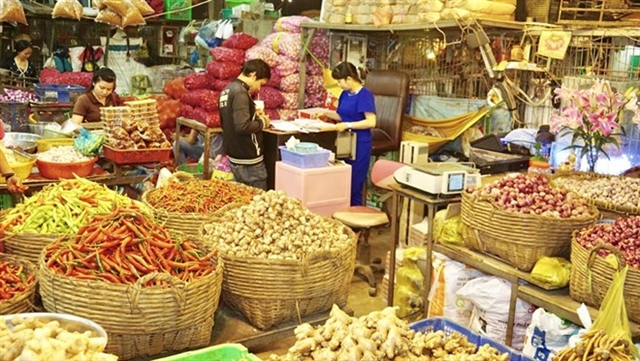 Society
Society

PM Phúc said the task of economic recovery was more urgent than ever and that Việt Nam must make use of the fact it has controlled the COVID-19 pandemic early.

|
| Spices stalls in Bình Điền wholesale market in HCM City. — VNA/VNS Photo |
HÀ NỘI — Việt Nam will deploy any measure to boost its investment, export and consumption sectors to achieve growth as high as possible, Prime Minister Nguyễn Xuân Phúc said on Thursday, comparing the three sectors to three horses that pull the country’s economic growth.
Chairing a meeting between the Government and localities, PM Phúc said the task of economic recovery was more urgent than ever and that Việt Nam must make use of the fact it has controlled the COVID-19 pandemic early.
“We will not let the pandemic make a resurgence in the country and at the same time, we have to make strong moves to develop the economy and gain growth,” he said.
The COVID-19 pandemic has been developing unpredictably around the world, causing major credit institutions like the Organisation for Economic Co-operation and Development (OECD), the World Bank and International Monetary Fund to make gloomy predictions project about the global economy and Việt Nam’s economy has been also hit hard.
In the second quarter of this year, Việt Nam’s economic growth was 0.36 per cent, the lowest rate in the last 30 years. In the first half of this year, its growth was 1.81 per cent with a reduction in consumption and exports. International tourist arrivals dropped 99.3 per cent.
However, PM Phúc said that, in general, there were still bright points in Việt Nam’s economy.
For example, its macro-economy remained stable, which created a foundation for recovery.
Việt Nam achieved a trade surplus of US$4 billion in the first half of this year, social investment increased, State budget collection relatively met targets, the exchange rate remained stable, and interest rates continued falling.
The index of industrial production (IIP) improved with an increase of 11.9 per cent from April to May and 10.3 per cent from May to June.
Enterprises are optimistic about business in the third quarter of this year, according to a survey of processing and manufacturing companies.
The number of enterprises established in June increased by 27.9 per cent. In the first half of this year, 25,200 enterprises resumed operation, an increase of 16.4 per cent compared with the same period last year.
PM Phúc also highlighted the success of 36th ASEAN Summit that Việt Nam hosted last month and the National Assembly’s ratification of the EU-Vietnam Free Trade Agreement (EVFTA) and the EU-Vietnam Investment Protection Agreement (EVIPA).
Seeing difficulties ahead, the Prime Minister asked for special mechanisms, policies and solutions for Việt Nam to adapt the 'new normal'.
The country’s macro-economy is generally steady but still face risks such as oil price fluctuations, high pig prices and risks in the foreign exchange rates, international trade, investment, finance and monetary matters.
“Ministries, agencies and localities at all levels need to identify possible internal and external risks for timely and effective management,” he said.
At the meeting, PM Phúc also said nearly VNĐ700 trillion ($30 billion) of this year’s public investment had not been disbursed.
“If the capital is disbursed properly, it will be an effective stimulating measure in the short-term, creating an engine for economic growth in the remaining months of this year and early next year,” he said.
He also emphasised the need to take measures to expand Việt Nam’s international markets, boost domestic consumption, review and improve legal frameworks and simplify administrative procedures.
Phúc also asked agencies to study and develop new economic sectors like the digital economy and the urban economy in Việt Nam.
Attracting social investment, private investment and foreign direct investment (FDI) was also key. The PM said that if Việt Nam failed to offer proper conditions, for example, infrastructure or incentives, FDI would go to India, Indonesia, Thailand or Malaysia instead of Việt Nam.
Minister of Investment and Planning Nguyễn Chí Dũng said that although economic growth in this year’s first half was the lowest in the last decade, Việt Nam was among few countries that achieved positive growth during the COVID-19 pandemic.
Dũng said that now was the time to create a new engine for development as, thanks to the country’s effective pandemic control, Việt Nam gained a good position, reputation and prestige on the global stage.
“We must take such advantage to effectively receive international investment flow, promote innovations, digitalisation and develop standards/regulations to meet international norms in global/regional economic governance,” he said.
Each sector, each locality and each project needs to focus on seeking room for growth, he said.
In agriculture, it was needed to prevent and control diseases for poultry and cattle, speed up pig re-herding, stabilise the pork price and support pig farmers with preferential loans.
In industrial production, it was important to restore production-supply chain or broken value chains and develop new value chains.
The minister emphasised the need to reinforce the domestic market with programmes to stimulate domestic tourism and consumption.
According to Dũng, monetary policies that support economic growth should be continued, for example, extending the time for enterprises to return debts, cutting interest rates, and offering more preferential loans.
Minister of Labour, Invalid and Social Affairs Đào Ngọc Dung said teachers working for private schools should benefit from the social welfare bailout package for people most affected by the pandemic.
He also suggested the Government offer loans under the bailout package to firms which did not have enough funds to pay their workers.
Under current criteria for beneficiaries, only enterprises which do not have revenue can access the preferential loans, he said, adding that, if a company did not have revenue, it was nearly bankrupt or dissolved. — VNS




